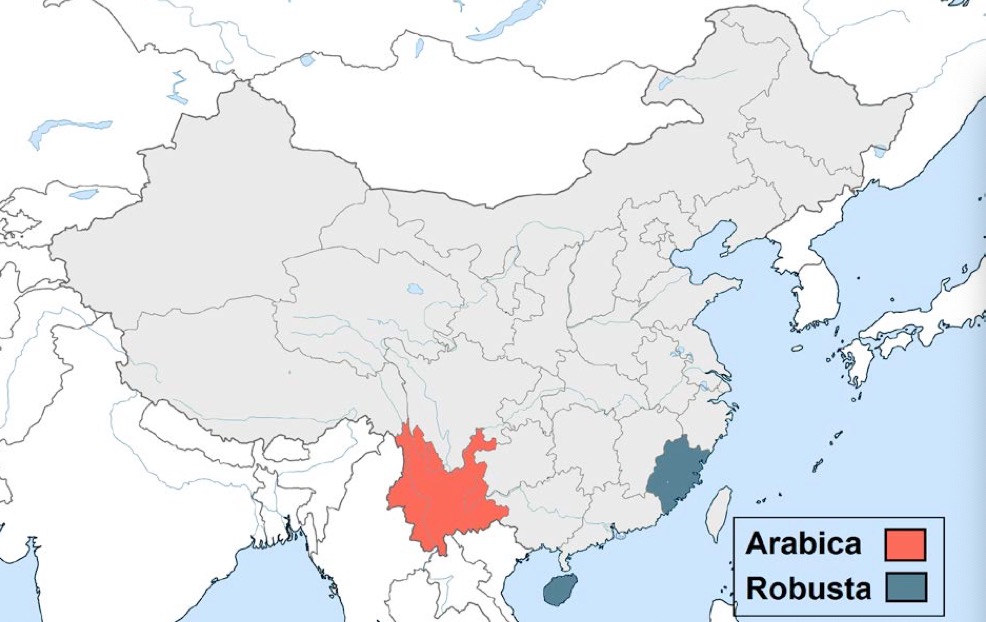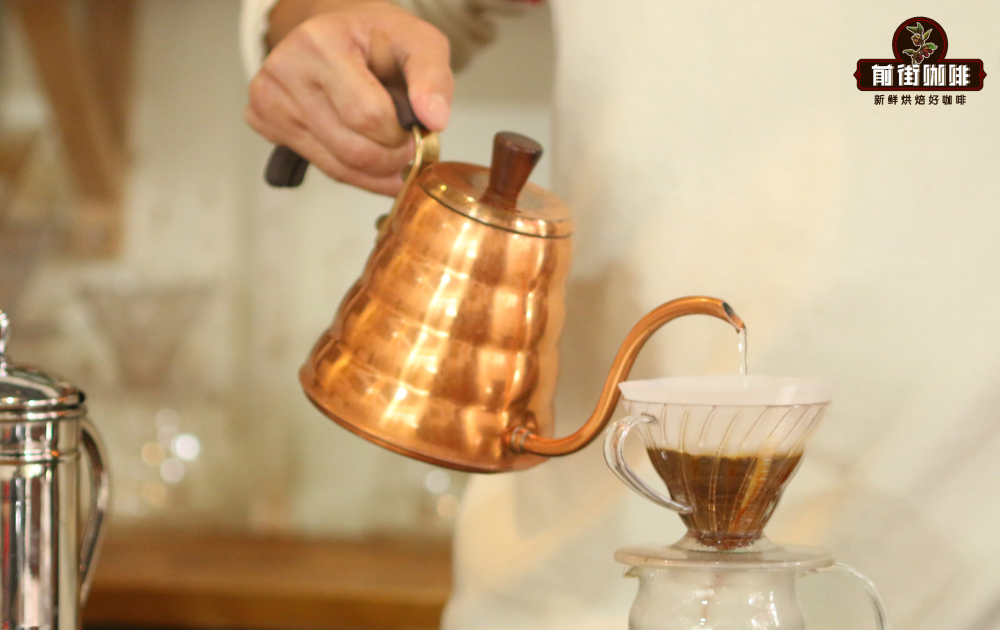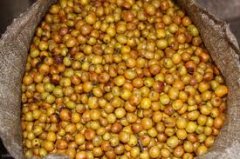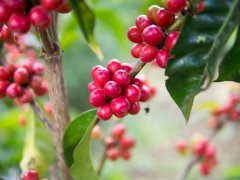What is Yunnan Arabica Coffee Yunnan Coffee Bean Variety Taste Flavor Description

Qianjie Coffee has learned that when most of our friends first enter the pit of boutique coffee, they come into contact with African Ethiopian Yegashifi or Sidamo producing areas, while when it comes to Asian producing areas, most people will first think of Indonesia's Mantenin coffee beans. However, with the rise of the tide of domestic products, Yunnan coffee in China began to gradually enter everyone's line of sight.
However, when it comes to domestic products, the feeling left by the domestic cosmetics and skin care products market is still lingering fear, and they will feel that the quality of domestic products is not high. In fact, the quality of Yunnan coffee beans has long been comparable to that of beans from other large producing areas.
What coffee bean producing areas are there in China?

When it comes to coffee bean producing areas in China, there are mainly three, namely, Fujian Province, Hainan Province and Yunnan Province. Arabica is planted at an altitude of 900m to 2000 m; Robska is planted at an altitude of 200m to 800m. Those who are familiar with Chinese geography all know that Fujian Province and Hainan Province are coastal areas, with an average altitude of less than 500 meters, which is not the ideal planting height for Arabica, so these two provinces mainly grow robusta beans. Yunnan Province, located in the second step, with an average elevation of 1000 to 2000 meters above sea level, is an ideal planting height for Arabica.
What are the producing areas in Yunnan Province

The earliest place to grow Arabica coffee beans in Yunnan was Zhu Kula Village, Pingchuan Town, Binchuan County, Dali. Because in the late Qing Dynasty, Father Tian Deneng from France had a habit of drinking coffee, so he planted a coffee tree next to the church. According to the Chronicles of Binchuan County, "in the 30th year of Guanxu of the Qing Dynasty (1904), Tian Deneng, a French Catholic missionary, was sent by the Dali Diocese Church to preach in Binchuan area with French Lu Hongru and Sichuan Deng Peigen." There is also a record in the History of Catholicism in Yunnan: "the name and address of the church: Catholic Church, Pingchuan Zhu Kula, Pennsylvania, founded in the 30th year of Guang Xu (1904)." These documents can prove that Father Tian Deneng actually funded the construction of a church to preach in the village of Zhu Kula in 1904. But this time is controversial, some say it is 1892, some say it is 1902. But so far there is no definite evidence to prove the year in which the first Arabica coffee tree in Yunnan was planted.
Today, there are four main producing areas of coffee beans in Yunnan, most of which are concentrated in the west and south of Yunnan Province, between 15 degrees north latitude and the Tropic of Cancer, and the topography is mainly mountainous and sloppy. Undulating, fertile soil, sufficient sunshine, rich rainfall and large temperature difference between day and night, these unique natural conditions form the particularity of Yunnan coffee taste, strong but not bitter, fragrant but not strong, slightly fruity.

[Dehong]: it enjoys the laudatory name of "hometown of Coffee in China". It has a typical South Asian tropical rain forest climate, no severe cold in winter, no heat in summer, short frost period, small temperature difference, and an average planting altitude of more than 1000 meters. It is recognized by domestic experts as the most suitable area for growing small-grain coffee in China. The coffee produced has a unique flavor and good quality, and has a high reputation in domestic and foreign markets.
[Baoshan]: the planting history of Baoshan coffee in Yunnan began in the mid-1950s, and the first coffee seedling was introduced from Southeast Asia by Mr. Liang Jinshan, a patriotic overseas Chinese. Baoshan small grain coffee is famous all over the world and is a national geographical indication product. Merchants in Europe, the United States, Egypt, Hong Kong and Macao, especially in Britain, the United States, Egypt, Hong Kong and Macao all regard it as the best coffee, and the products are in short supply.
[Lincang]: Lincang City is located in the southwest of Yunnan Province, with the Tropic of Cancer running through the south, Pu'er to the east, Dali to the north, Baoshan to the west, and Myanmar to the southwest, named for its proximity to the Lancang River. Because of its unique geographical location and climatic conditions, Lincang has become the focus of many coffee enterprises.
[Pu'er]: tea village Pu'er has a very long history of cultivating coffee, which has a history of 150 years. Although Pu'er City is famous for its tea, its coffee planting area has reached 789000 mu, with an output of 58600 tons and a total output value of 2.469 billion yuan, making it the largest coffee planting base in Yunnan. Its climate, geography and soil conditions are unique for growing coffee.
Yunnan coffee bean varieties
Yunnan coffee beans are most famous for Yunnan Xiaomi. Yunnan small grain originally got its name from the iron card, because the iron card seed is the Arabica small seed. The oldest variety of coffee in Yunnan is the tin card. Later, Nestl é settled in Yunnan, because of the poor disease resistance of the iron pickup, but also in order to increase the output of coffee beans, coffee farmers cut down the iron pickup coffee trees with good flavor to plant varieties with poor flavor but good disease resistance and high yield. S288, which is resistant to leaf rust, was initially introduced, and later Katim, which had a higher yield, was introduced. In other words, the coffee trees planted in Yunnan are mainly Katim species.

[iron pickup Typica]
Iron pickup is one of the oldest varieties of Arabica, all Arabica are derived from the tin card seed, the derived variety beans can inherit its high-quality flavor genes. The top leaf of Tieka coffee tree is red copper, the opposite leaf is long oval, the leaf surface is smooth, the end branch is long, the branch is few, the bean body is oval or thin, the flavor is elegant, but the system is weak, the disease resistance is poor, easy to get leaf rust, the yield is less.

[Katim Catimor]
Katim himself is a hybrid of Robusta and Arabica. In 1959, the Portuguese moved Kaddura, a bourbon variant of Arabica descent, to East Timor to mix with Tim Timor, a native of Robusta descent. This move has cultivated Katim, who has high disease resistance and high production capacity. And because leaf rust was prevalent in coffee producing countries around the world at that time, Katim vigorously promoted it in various producing countries with the help of international organizations for its strong disease resistance and high production capacity.
Now you can also find iron pickup and Katim, which are both washed in Baoshan, Yunnan, on the bean list of Qianjie Coffee. Let us not only taste the light of our domestic products, but also let us feel the difference between different varieties.
[Qianjie Coffee Yunnan Huaguoshan Coffee]

Producing area: Baoshan, Yunnan
Altitude: 1200m
Treatment method: washing
Variety: iron pickup
[Qianjie Coffee Yunnan small Coffee]

Producing area: Baoshan, Yunnan
Altitude: 1200m
Treatment method: washing
Variety: Katim
Cooking suggestion

Qianjie Coffee recommends that when these two cups of Yunnan coffee are washed, they tend to be balanced, requiring neither too much acidity nor too much modification of the tail section. The amount of coffee powder is 15g, the ratio of powder to water is recommended at 1:15, the flavor can be clearer at 1:16, the filter cup is kono filter cup, the temperature of brewing water is 88 degrees Celsius, the aim is to make the acid softer and the size of fine grinding / fine sugar (the pass rate of sieve 20 is 80%).
The use of three-stage extraction: steaming with 30 grams of water for 30 seconds, small water injection around the circle to 125 grams for stages, when the water level is about to expose the powder bed, continue to inject water to 225 grams to stop water injection, wait for the water level to drop and remove the filter cup when the powder bed is about to be exposed, (the time of steaming starts) the extraction time is 2 minutes 39 percent 00 ".

Professional coffee knowledge exchange more coffee bean information please follow the coffee workshop (Wechat official account cafe_style)
For more boutique coffee beans, please add private Qianjie coffee on Wechat. WeChat account: kaixinguoguo0925
Important Notice :
前街咖啡 FrontStreet Coffee has moved to new addredd:
FrontStreet Coffee Address: 315,Donghua East Road,GuangZhou
Tel:020 38364473
- Prev

What are Brazilian coffee brands? What is the best Brazilian coffee brand pilao?
Professional coffee knowledge exchange More coffee bean information Please pay attention to coffee workshop (Weixin Official Accounts cafe_style) to learn more about Brazil, the world's largest coffee producing country. Brazilian coffee bean grade coffee bean is the seed of coffee fruit. After factory treatment, roasting, coffee grinder grinding and brewing, it will finally become the coffee we drink. It's like drinking wine, it's like drinking wine
- Next

How is the development of coffee in Yunnan, China? How about Yunnan small grain coffee? is it good?
Professional coffee knowledge exchange more coffee bean information please follow the coffee workshop (Wechat official account cafe_style) how to brew Yunnan small coffee 90% of the coffee production in Yunnan, Starbucks, Nestl é have set up factories to buy cheap coffee beans. But this stereotype has been broken this year. The top coffee in Yunnan sells for tens of thousands of Taiwan dollars per kilogram, which should be reversed with fine coffee.
Related
- Detailed explanation of Jadeite planting Land in Panamanian Jadeite Manor introduction to the grading system of Jadeite competitive bidding, Red bid, Green bid and Rose Summer
- Story of Coffee planting in Brenka region of Costa Rica Stonehenge Manor anaerobic heavy honey treatment of flavor mouth
- What's on the barrel of Blue Mountain Coffee beans?
- Can American coffee also pull flowers? How to use hot American style to pull out a good-looking pattern?
- Can you make a cold extract with coffee beans? What is the right proportion for cold-extracted coffee formula?
- Indonesian PWN Gold Mandrine Coffee Origin Features Flavor How to Chong? Mandolin coffee is American.
- A brief introduction to the flavor characteristics of Brazilian yellow bourbon coffee beans
- What is the effect of different water quality on the flavor of cold-extracted coffee? What kind of water is best for brewing coffee?
- Why do you think of Rose Summer whenever you mention Panamanian coffee?
- Introduction to the characteristics of authentic blue mountain coffee bean producing areas? What is the CIB Coffee Authority in Jamaica?

